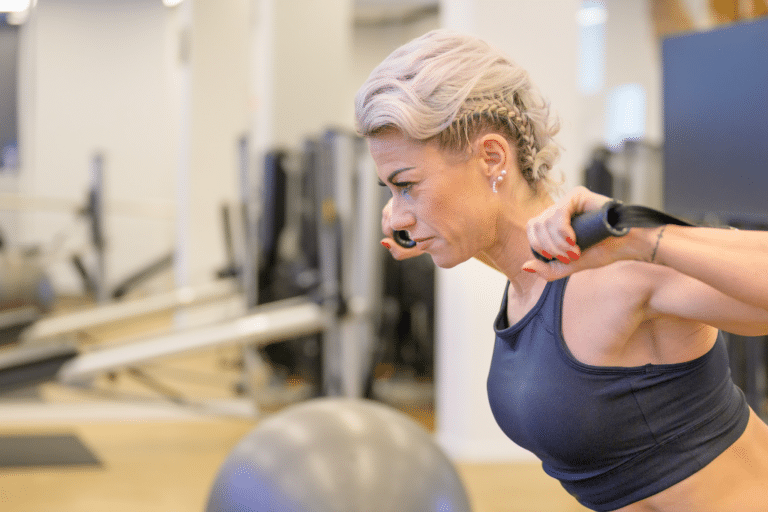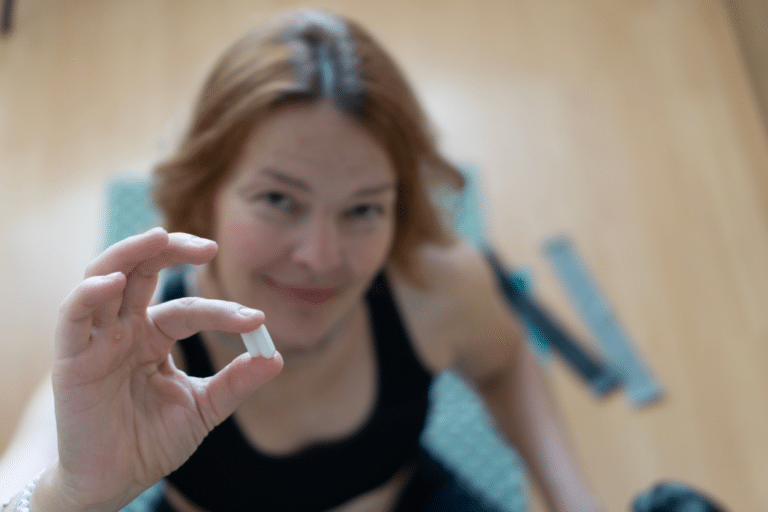The Importance of Body Composition
Let’s have a real conversation about something that’s been on my mind lately – especially as I work with brilliant women who are absolutely crushing it in their careers but feeling frustrated with their bodies after 40.
Here’s a truth bomb for you: That number on the scale? It’s about as useful as last season’s trend report. What really matters for your health, longevity, and yes, even how you look and feel, is your body composition. Let me explain why this shift in thinking could literally add years to your life and keep you from getting down on yourself.
First, let’s get scientific (in a fun way, I promise!). Body composition refers to the ratio of fat mass to lean mass (mostly muscle) in your body. Dr. Peter Attia, in his groundbreaking book “Outlive,” emphasizes that maintaining muscle mass as we age isn’t just about looking toned – it’s quite literally a matter of life and death. Research shows that after age 40, we typically lose 3-8% of our muscle mass per decade, and this loss accelerates after 60. This is not good news!
But here’s where it gets really interesting…
Picture two women, both 5’6″ and 150 pounds. From the outside (and on BMI charts), they appear identical. But Woman A has 35% body fat and 97.5 pounds of lean mass, while Woman B has 25% body fat and 112.5 pounds of lean mass. Same weight, dramatically different health trajectories!
Why does this matter so much?
- Metabolic Health: Muscle tissue is like your body’s personal power plant. More muscle means better glucose control, improved insulin sensitivity, and reduced risk of type 2 diabetes. A 2021 study in the Journal of Clinical Medicine showed that higher muscle mass was associated with better metabolic health markers, regardless of total body weight.
- Longevity: Here’s a fascinating finding – grip strength (a marker of overall muscle mass) is a better predictor of mortality than blood pressure! The stronger you are, the longer you’re likely to live. This isn’t about bench pressing your body weight – it’s about maintaining functional strength for a vibrant life. This is what got me starting to work out when I was 50. I could see what I wanted for myself at 70, and what I was doing sure wasn’t going to get me there!
- Brain Health: Emerging research suggests that maintaining muscle mass may protect against cognitive decline. Think of muscle as your brain’s insurance policy!
- Quality of Life: Want to play with your grandkids, carry your own luggage through Paris, or maintain your independence well into your golden years? YES, you say! Me too. That’s all about muscle, not about the number on your scale.
So, what can you do with this information?
First, let’s reframe how we think about exercise. Those 45-minute cardio sessions? They’re great for your heart, but they’re not enough. Resistance training is non-negotiable after 40. And no, you won’t bulk up – we simply don’t have the hormonal profile for that anymore! Do this 2-3 times a week. I always recommend working with a trainer to get you going so you can focus on form, which will, in turn, help prevent injuries.
Second, protein becomes your new best friend. Most women I work with are seriously under-eating protein. The research is clear – we need about 1.2-1.6 grams per kilogram of body weight daily, especially as we age. That morning coffee isn’t cutting it as breakfast anymore! If you’re doing intermittent fasting (IF), you still need to get that protein in over a shorter period of time.
Third, and this is crucial – we need to measure what matters. Instead of stepping on the scale, consider:
- DEXA scans for accurate body composition measurements
- Grip strength tests
- Functional movement assessments
- Bioimpedance analysis (BIA)
Here’s what I want you to take away from this: You’re not just trying to lose weight – you’re building a stronger, more resilient body that will carry you through decades of board meetings, family celebrations, and adventures yet to come.
Remember, your body is incredibly adaptive at any age. One of my clients, a 52-year-old CEO, recently discovered she was stronger than her 30-year-old self after just six months of focused strength training and proper nutrition. That’s not a miracle – that’s science! And I personally doubled my quad strength over about a 9-month period. And reversed osteopenia with weight lifting.
Want to learn more about how to optimize your body composition for longevity? This is exactly what we explore in my coming comprehensive health optimization program. Because you deserve to thrive, not just survive, in this chapter of your life!
References:
- Attia, P. (2023). Outlive: The Science and Art of Longevity
- Wolfe, R. R. (2017). The underappreciated role of muscle in health and disease. American Journal of Clinical Nutrition
- McGlory, C., et al. (2019). Protein Recommendations for Weight Loss in Elite Athletes: A Focus on Body Composition and Performance. International Journal of Sport Nutrition and Exercise Metabolism
- Cruz-Jentoft, A. J., et al. (2019). Sarcopenia: revised European consensus on definition and diagnosis. Age and Ageing
Dr. Anna Garrett is a menopause expert and Doctor of Pharmacy. She helps women who are struggling with symptoms of perimenopause and menopause find natural hormone balancing solutions so they can rock their mojo through midlife and beyond. Dr. Anna is the author of Perimenopause: The Savvy Sister’s Guide to Hormone Harmony. Order your copy at www.perimenopausebook.com.
Dr. Anna is available for 1-1 consultation. Find out more at www.drannagarrett.com/lets-talk




